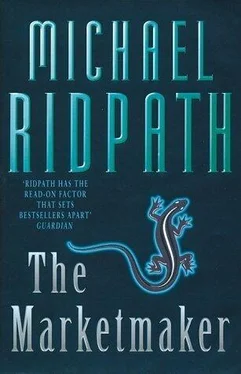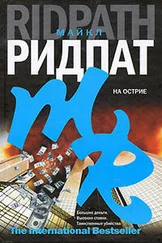Michael Ridpath
The Marketmaker
Thanks are due to the many Brazilians in London and Brazil who took the time to tell me about their country and themselves. In particular I should like to thank Jaime Bernardes of Editorial Nordica, who was an excellent host and guide; Maria Silvia Marques, formerly Treasury Secretary of the City of Rio de Janeiro; Luiz Cezar Fernandes, Chairman of Banco Pactual; Jorge Mamão, People’s Administrator of the Rocinha favela ; Heckel Raposo, security consultant; Pedro Paulo de Campos, Managing Director of Oppenheimer in São Paulo; and Allan and Stephanie Walker.
I should also like to thank Aidan Freyne and his colleagues at Salomon Brothers Emerging Markets Desk in London for their time and patience, and Phil Cavendish for all his help.
The man sitting opposite, coolly watching me through a haze of cigarette smoke, controlled the financial future of a continent. More importantly, he controlled mine.
‘Thank you for coming in to see us, Nick,’ he said. ‘Jamie has told me a lot about you. A lot of good things.’ His voice was deep, his enunciation careful, his accent public-school English with a tinge of South American.
‘He’s told me a lot about you too.’
In fact, for the last week Jamie had briefed me thoroughly on Ricardo Ross. His father was Anglo-Argentine, his mother Venezuelan, and he had been educated at a private school in England. He had been with Dekker Ward for ten years, and over that time had transformed it from a sleepy third-tier London stockbroker into the leading force in the Latin American bond markets. Ricardo’s élite Emerging Markets Group was now the envy of traders and salesmen in London and New York, and Jamie believed Ricardo would soon become one of the foremost figures in world finance.
And here he was, interviewing me for a job.
He looked good. Monogrammed striped shirt, delicate gold cuff-links, thick dark hair immaculately shaped. In a nod towards informality, his French silk tie hung a quarter of an inch below his undone top button, and his shirt sleeves were rolled up just enough to reveal a paper-thin Swiss watch.
‘Would you like a cup of coffee?’ he asked.
‘Thank you.’
We were in a cramped, workmanlike meeting room in a glassed-in corner of the trading floor. He reached for the phone on the small round table between us and hit a button. ‘Alberto? Two cups of coffee, please.’
In less than a minute a tiny old man neatly dressed in a black suit and tie brought us two small cups of coffee.
‘What I miss most about living in London is the coffee,’ said Ricardo. ‘It’s improving, but it still has a long way to go. Try this. It’s Colombian. I can promise you, you will not find a better cup anywhere in London.’ He sat back in his chair, one elegantly trousered leg resting on the other. He allowed the slightest of smiles to play across his narrow, handsome face. I noticed that every few moments the fingers of his left hand twitched, deftly playing with his wedding ring.
The coffee was smooth and rich, an entirely different drink from the Nescafé instant I was used to.
Ricardo sipped his, took a moment to savour it, and carefully replaced the cup in its saucer. ‘How many of the guys have you seen so far?’ he asked.
‘You’re the seventh.’
Ricardo smiled. ‘A long morning. So, you know all about Dekker Ward by now?’
‘I’ve heard a lot. But it’s your firm. You tell me.’
‘Well, I only run the Emerging Markets Group here,’ he said, nodding towards the dealing room behind him. ‘The rest of the firm is back in the City, where they’ve been for a hundred and fifty years. I can leave them to Lord Kerton, the chairman. We like to keep our distance.’
They certainly did. We were sitting forty-odd floors up above Canary Wharf, three miles to the east of the City of London.
‘But your group makes ninety per cent of Dekker Ward’s profits?’
‘Ninety-five.’ Ricardo smiled.
‘How do you do it?’
‘We’re the best at what we do,’ he replied. ‘By a long way. We dominate the market for Latin American debt. We lead-manage more bond issues for Latin American borrowers than our next three competitors combined. We trade more aggressively than anyone else on the street. We know everyone. If you want to borrow money, you have to talk to us. If you want to invest money, you have to talk to us. We made this market. It’s ours, and there are big profits in it.’
‘I can imagine there are. But how did you get to that position?’
‘We’re always a step ahead of the rest of the market. We spotted the opportunity before anyone else did. When Andrew Kerton brought me in, ten years ago, I think he just wanted to build up a profitable little sideline to the rest of the firm. I’m sure he had no idea how big we’d become. Back in the eighties, when the rest of the world had written off Latin America, we were persuading people to invest again. Mostly Latin Americans who had money invested offshore. We teamed up with Chalmet, a private Swiss bank. They had plenty of clients who were eager to put money back into the area.’
He paused to take a drag of his cigarette. His eyes flicked at me to check if I was following him. I was.
‘Then the big commercial banks, who had lent billions to the region in the seventies, began to sell their loans at a big discount. We helped them, stood in the middle. In the early nineties, many of these loans were converted into bonds, known as Bradys. We traded them, passed them on from the commercial banks to new investors. And in the last few years people have been willing to invest new money into Latin America. So we’ve been organizing bond issues for everyone from Brazilian glass-manufacturers to the Republic of Argentina.’
‘Don’t you have any competition?’
Ricardo chuckled. ‘Certainly we do. Everyone is involved in this game. But we were there first, we have all the contacts, we have the best people. If any other firm wants to lead a bond issue for a Latin American borrower, they know they have to invite us as a co-lead. Those are the rules.’
‘And if they’re broken?’
‘Then the issue fails. Nothing happens without our support.’
‘A nice position to be in,’ I said.
Ricardo nodded. ‘But we have to be on our toes. That’s why I want to make sure we always have the best people in the market. Without that, we’re nothing.’
I glanced out of the window of the little meeting room, into the trading room behind, with its jumble of desks and equipment, and the men and women talking, dialling, staring at screens, milling around. The muffled murmur of all this action seeped in through the glass walls. I wondered what these people were doing, who they were talking to, what they were talking about. Numbers flickered on countless computer screens. What did they all mean?
Beyond this mysterious activity stretched the clear blue sky, the empty space above London’s Docklands.
Ricardo followed my gaze. ‘They’re young. Smart. Hard-working. They all have different backgrounds, from the Argentine aristocracy to a Romford comprehensive. There aren’t many of us, but we’re an élite. There’s no room for passengers. Every one of us makes a contribution.’
I nodded. Ricardo was silent, waiting for my next question. What I really wanted to ask was, ‘In that case why the hell am I here?’ Instead I settled on something a bit more intelligent. ‘What about the emerging markets outside Latin America?’
‘Good question. There’s not much we can do in Asia. There are plenty of banks out there, and the market for debt is pretty boring. Eastern Europe is more interesting, although even that is becoming more respectable. Did you know Slovenia is rated single A? That’s almost as good as Italy.’
Читать дальше












